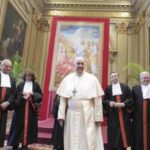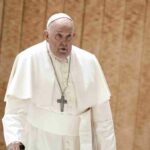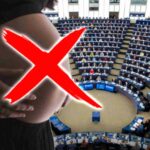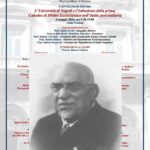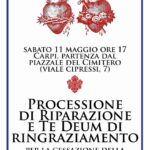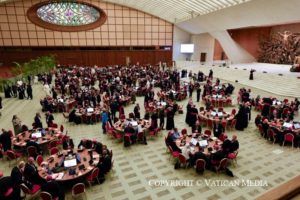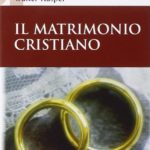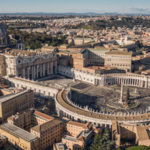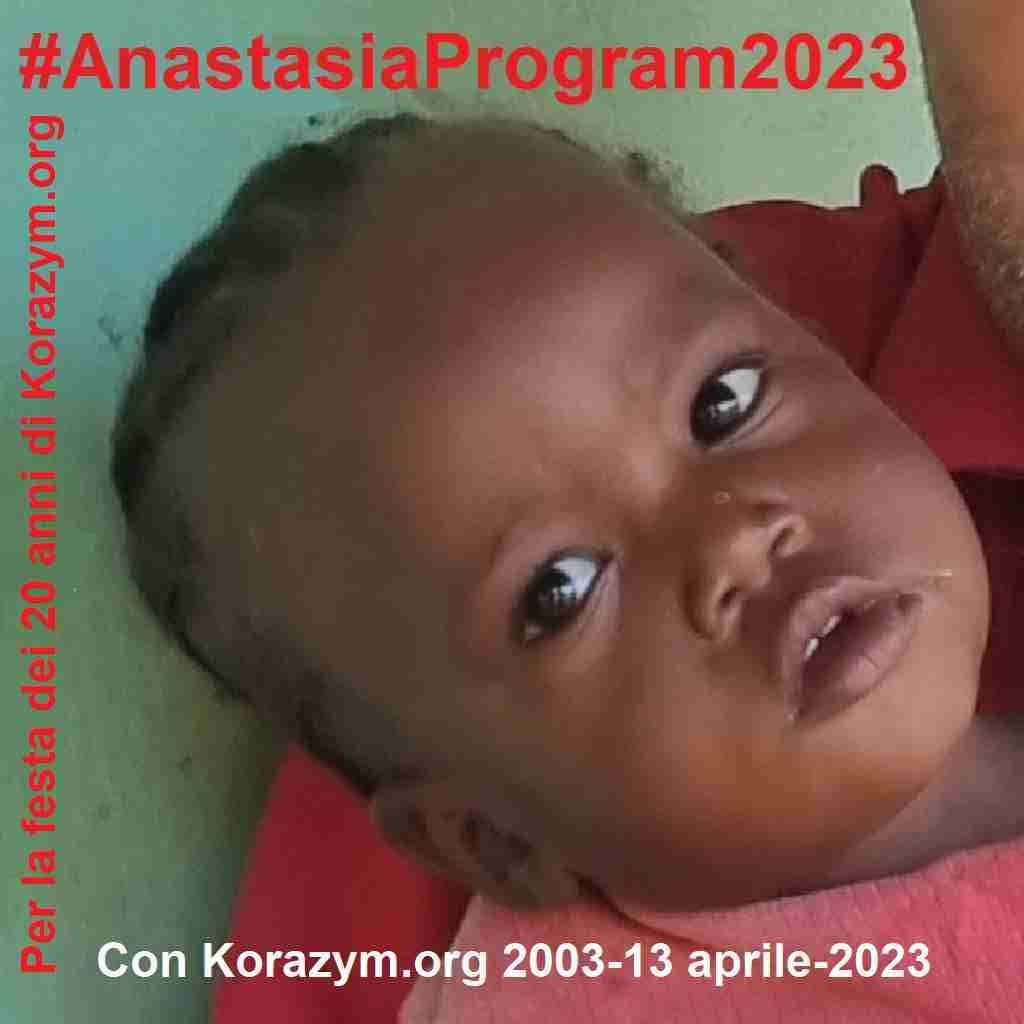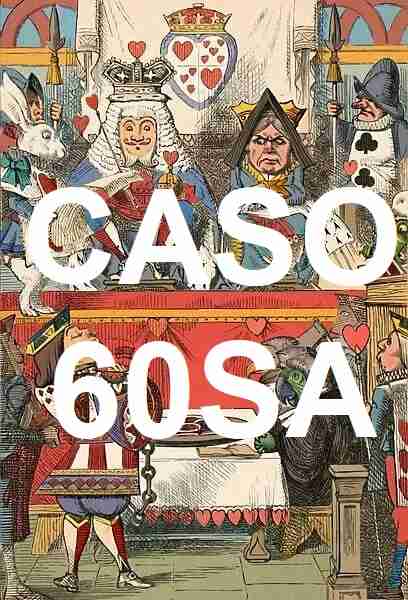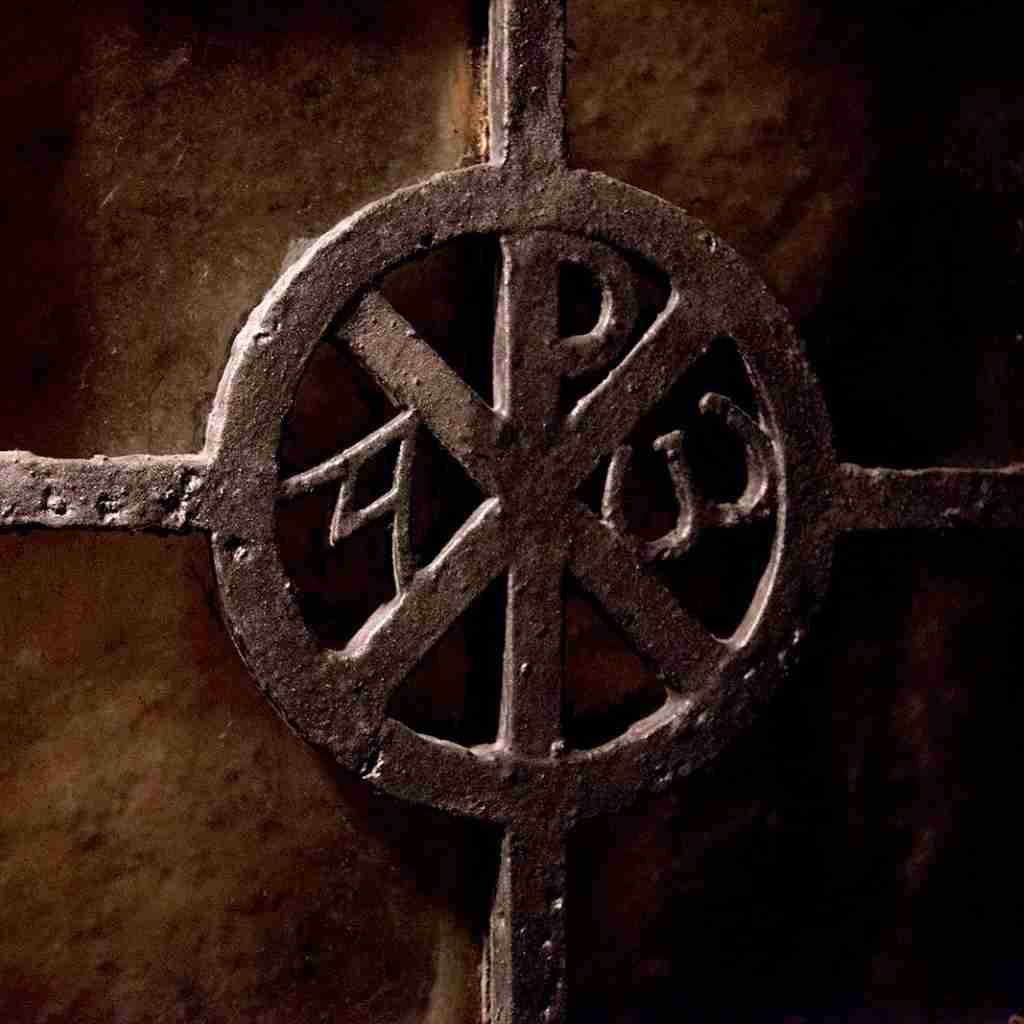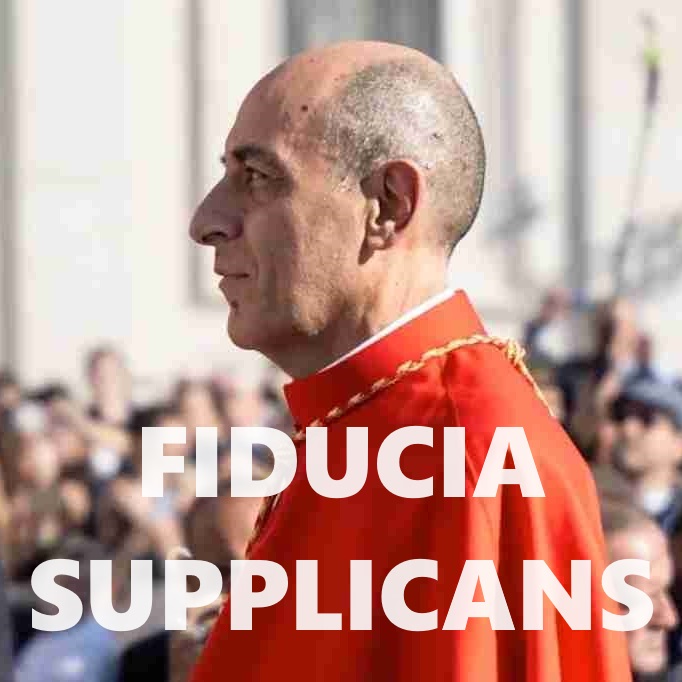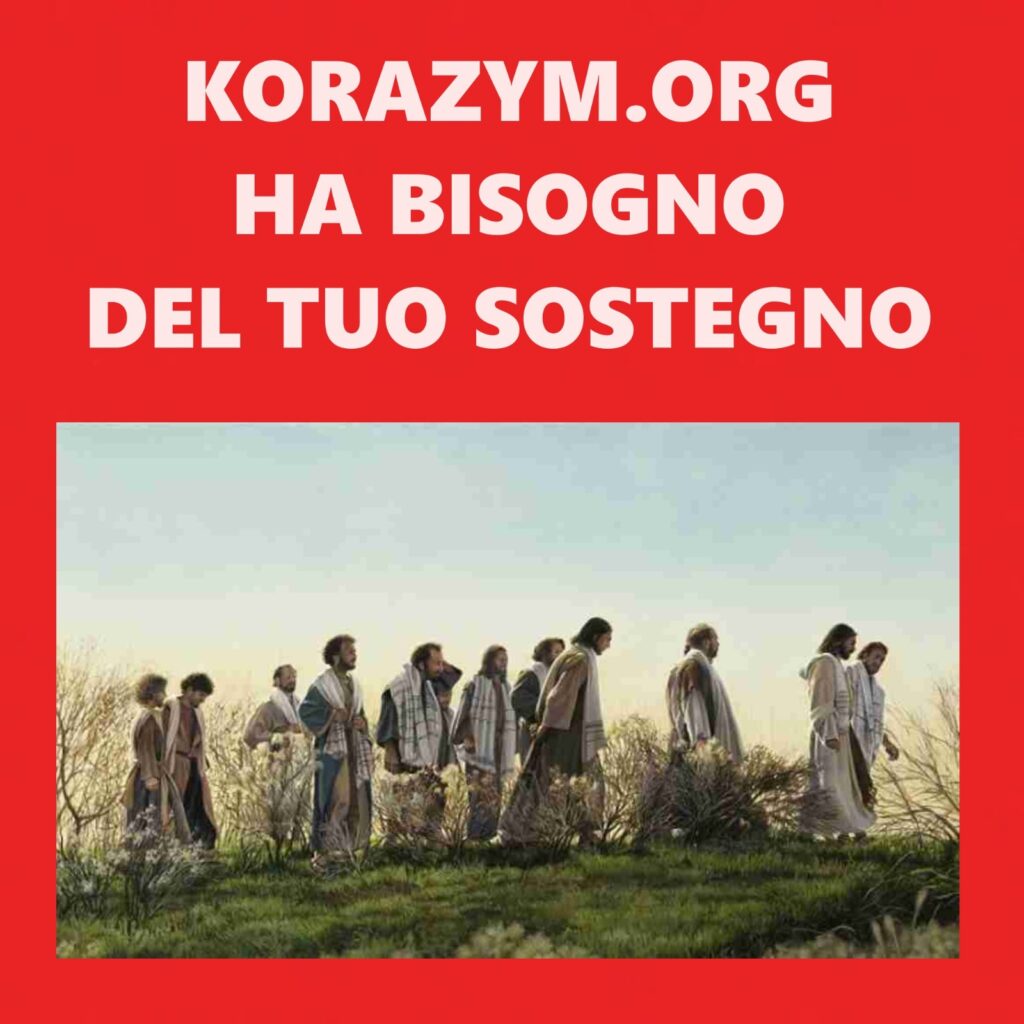Omelia del Vescovo Barron nella Messa da requiem per i non nati. “L’aborto non è un problema minore. Non c’è attacco più brutale alla vita umana di questo”

Sabato 23 gennaio 2021 il Vescovo ausiliare di Los Angeles, Mons. Robert Barron ha tenuto l’omelia nella Messa da requiem per i non nati, presieduta dall’Arcivescovo metropolita di Los Angeles e Presidente della Conferenza dei Vescovi Cattolici degli Stati Uniti, Mons. José H. Gomez nella Cattedrale di Nostra Signora degli Angeli, dopo OneLife LA di quest’anno, che è stata celebrata virtualmente a causa della pandemia da Covid-19.
Segue il testo integrale dell’omelia del Vescovo Barron in inglese, preceduto dalla nostra traduzione di lavoro italiana.

Miei cari fratelli e sorelle nel Signore Gesù, vorrei innanzitutto offrire una parola di gratitudine all’Arcivescovo Gomez per la sua guida qui nell’Arcidiocesi di Los Angeles e nella Chiesa degli Stati Uniti, soprattutto per quanto riguarda la causa pro vita. In secondo luogo, vorrei ringraziare tutti voi che lavorate per anni nella vigna del Signore, sforzandovi di proteggere la vita in tutte le fasi. Che Dio vi benedica e continui a darvi forza e coraggio!
Perché combattiamo per la vita? Lo facciamo perché siamo Americani e perché siamo Cattolici. Come Cattolici sappiamo che Dio è un Dio della vita. I versetti iniziali del libro della Genesi ci dicono che il Signore crea la vita in tutta la sua meravigliosa abbondanza e diversità e dona alla vita umana una dignità unica. Inoltre, praticamente ogni libro dell’Antico Testamento conferma che Dio sigilla le sue alleanze con l’umanità con l’ingiunzione: “Siate fecondi e moltiplicatevi!”. Sappiamo dal profeta Geremia che anche la vita umana non ancora nata è sacra, poiché il Signore disse a Geremia: “Prima di formarti nel grembo materno, ti conoscevo; un profeta per le nazioni che ti ho nominato”.
Sappiamo, anche, che la vita dei malati e degli anziani è importante, perché il libro dei Proverbi ci dice: “Non disprezzare tua madre quando è vecchia”, e il libro del Siracide dice: “Figlio mio, aiuta tuo padre nella sua vecchiaia e non rattristarlo finché vive; anche se la sua mente fallisce, sii paziente con lui”. Sappiamo che la vita dei poveri e dei dimenticati conta per il profeta Isaia, trasmettendo la voce del Signore, dice: “Non è questo il digiuno che scelgo: lasciare che gli oppressi vadano liberi e rompere ogni giogo… condividi il tuo pane con gli affamati e porta i poveri senza tetto nella tua casa”.
Gli stessi temi sono suonati anche nel Nuovo Testamento. Nel decimo capitolo del Vangelo di San Giovanni, lo stesso Signore Gesù dice: “Sono venuto affinché tu possa avere la vita e averla in pienezza”. E questo include la vita del nascituro, perché nella storia della Visitazione, poiché apprendiamo che “dopo aver ascoltato la voce di Maria, Giovanni Battista sussultò di gioia nel grembo di sua madre”. La cosa più importante, al centro della proclamazione evangelica della Chiesa è che Gesù crocifisso è stato, attraverso la potenza dello Spirito Santo, risorto dai morti. Quindi il nostro Dio è definitivamente e in modo provocatorio un Dio della vita.
Ed è per questo che, sin dai suoi primi giorni, la Chiesa ha promosso e protetto la vita umana. In effetti, la radicale riluttanza dell’antica comunità cristiana a tollerare gli assalti alla vita era un fattore chiave per attirare le persone al nuovo movimento. Ecco perché, anche oggi, la Chiesa si oppone a qualsiasi tentativo di attaccare direttamente la vita umana in qualsiasi fase del suo sviluppo.
Ma come ho detto, siamo anche difensori della vita perché siamo Americani. I grandi valori che stanno alla base del nostro unico esperimento politico di libertà ordinata sono quelli con cui i biblici trovano una profonda risonanza. “Riteniamo che queste verità siano evidenti: che tutti gli uomini sono creati uguali e sono dotati dal loro creatore di determinati diritti inalienabili”. Poiché la nostra uguaglianza nasce dall’essere creati, non pensiamo che i nascituri, gli anziani o i malati siano meno uguali del resto della popolazione. E poiché i diritti che abbiamo sono inalienabili, ottengono nei confronti dei più deboli e vulnerabili della nostra società.
E quali sono precisamente questi diritti? Thomas Jefferson ci dice: “la vita, la libertà e la ricerca della felicità”. Ancora una volta, poiché provengono non dallo Stato ma da Dio, questi privilegi sono insiti in tutti. Allora, chi siamo per dire a un bambino non ancora nato, “hai perso il diritto alla vita” o a una persona malata e anziana, “la tua libertà può essere abrogata”, o a qualcuno ai margini della società, “siamo indifferenti alla tua felicità. ” Come Americani, ci opponiamo a queste aggressioni ai diritti umani.
E amici, per affermare chiaramente ciò a cui ho già accennato, la nostra preoccupazione per la vita è ampia e profonda. Come afferma Papa Francesco, “sacra sono le vite dei poveri, di coloro che sono già nati, dei poveri, degli abbandonati e dei diseredati, degli infermi vulnerabili e degli anziani esposti all’eutanasia segreta, delle vittime della tratta di esseri umani, delle nuove forme di schiavitù e di ogni forma di rifiuto”. Pertanto, chiunque sia vittimizzato, chiunque sia solo e spaventato, chiunque sia sotto oppressione politica, chiunque subisca pregiudizi razziali, chiunque sia trattato con mancanza di rispetto a causa della sua religione, chiunque sia in pericolo di salute perché non riesce a trovare cibo a sufficienza o acqua pulita, viene legittimamente sotto la cura e preoccupazione della Chiesa.
Tuttavia, la Chiesa riconosce la necessità di stabilire priorità tra le questioni della vita, alzando la sua voce con particolare insistenza quando la vita umana è direttamente minacciata. Questo è il motivo per cui l’eutanasia, la pena capitale e l’aborto sono di primaria importanza. E di questi tre, la questione dell’aborto rimane, come l’hanno definita i vescovi degli Stati Uniti, “preminente”, a causa dell’enorme numero di vite che distrugge. Sapevate che ogni anno, tra il 2015 e il 2019, nel mondo si sono verificati 73 milioni di aborti indotti? Lo sapevate che tre gravidanze su dieci, in quegli stessi anni, sono finite con un aborto? Solo nel nostro paese, lo scorso anno si sono verificati più di 800.000 aborti e, dall’approvazione di Roe v. Wade, negli Stati Uniti si sono verificati oltre 61 milioni di aborti. Questo non è un problema minore; infatti, non c’è attacco più brutale alla vita umana di questo.
Così dice Papa Francesco: “Tra questi deboli, di cui la Chiesa vuole prendersi cura con predilezione, ci sono anche i bambini nascituri, che sono i più indifesi e innocenti di tutti”. E rivolgendosi ai difensori culturalmente alla moda della posizione pro-scelta, Papa Francesco afferma: “Voglio essere del tutto onesto al riguardo. Questo non è un argomento soggetto a presunte riforme o a ‘modernizzazioni’. Non è progressista pretendere di risolvere i problemi eliminando una vita umana”. E ancora più schiettamente: “Non è giusto ‘fare fuori’ un essere umano, benché piccolo, per risolvere un problema. È come affittare un sicario per risolvere un problema”.
Amici, da dove viene questa indifferenza alla vita? Proviene dai cuori umani peccatori, certo, ma anche da quella che San Giovanni Paolo II chiamava “la cultura della morte” e quella che Papa Francesco ha memorabilmente chiamato la “cultura dello scarto”. Ciò che è necessario, quindi, sia a livello personale che sociale è il pentimento. Ascolta Gesù dalla nostra lettura del Vangelo per questa sera. Questo è il suo discorso inaugurale, le prime parole che sentiamo da lui nel primo Vangelo: “Questo è il tempo del compimento. Il regno di Dio è vicino. Pentitevi e credete nel Vangelo”. Il regno di Dio è tutto ciò che ostacola la cultura della morte e la cultura dello scarto. È lo stato di cose che si ottiene quando a Dio è permesso di regnare su ogni aspetto della vita. Per entrarvi, bisogna sottoporsi alla “conversione”, metanoia, che in greco ha il senso di “andare oltre la mente che si ha” o “vedere in modo nuovo”.
L’espressione di Sant’Agostino per la cultura dello scarto e la cultura della morte è “la città terrena”, con cui intende una comunità centrata sull’amor proprio. La conversione, per Agostino, consiste nel passare dalla città terrena a quella che ha definito “la Città di Dio”, quella comunità basata non sull’amore di sé ma sull’amore di Dio. In quella città, piena di convertiti, la cultura della vita domina; in quella città nessuno è lasciato indietro; in quella città nessuno viene buttato via.

Quindi siamo tutti chiamati a un pentimento costante e sempre più profondo. Dobbiamo diventare, sempre più pienamente, cittadini della Città di Dio. Ma poi dobbiamo chiamare il resto del mondo alla conversione. La nostra prima lettura incomparabilmente ricca è tratta dal libro del profeta Giona, a cui Dio aveva ordinato di predicare alla depravata città di Ninive, la capitale di un impero profondamente nemico di Israele. Naturalmente, Giona esitò: gli fu detto di andare a est via terra, andò a ovest via mare, cercando di allontanarsi il più possibile dalla voce di Dio. Ma il Signore mandò un grande pesce che inghiottì il riluttante profeta e lo riportò dove Dio lo voleva. Una volta intrapreso il suo compito, divenne il più grande profeta di pentimento della storia. Tutti nella pagana Ninive, dal cittadino più comune allo stesso Re, indossavano il sacco – anche gli animali, ci viene detto, si pentivano!
Siamo tutti Giona! Dio vuole che predichiamo a Ninive, alla nostra società sempre più secolarizzata, a una cultura dell’usa e getta – ed è altrettanto scoraggiante ora come lo era allora. So che, come l’antico profeta, siamo tentati di scappare. Dati gli atteggiamenti e i pregiudizi della nostra società, riteniamo che questo compito sia semplicemente troppo scoraggiante. Ma se ci arrendiamo a Dio, potenti forze verranno in nostro aiuto!
Non c’è limite a ciò che il Signore potrebbe realizzare attraverso la nostra testimonianza. Predichiamo, certo, con le nostre parole, attraverso pubblicazioni, attraverso Internet, conversando con amici e nemici, marciando e alzando la nostra voce in pubblica protesta. Ma predichiamo in modo ancora più potente attraverso le nostre azioni.
Molti anni fa, il Cardinale John O’Connor di New York disse, che come espressione concreta di un impegno a favore della vita, ogni parrocchia della sua arcidiocesi dovrebbe essere disposta e in grado di prendersi cura di una donna incinta e del suo bambino, qualunque cosa accada, in ogni circostanza. Il successore del Cardinale O’Connor, il Cardinale Timothy Dolan ha raccontato una storia di pochi anni fa. Nel periodo natalizio, una giovane madre, una recente immigrata messicana, ha dato alla luce un bambino fuori dal matrimonio. Non aveva soldi; non aveva un posto decente dove stare e non aveva mezzi per prendersi cura di suo figlio. Così è andata alla sua parrocchia locale, dove si era sentita accolta e pose il suo bambino, con il cordone ombelicale ancora attaccato, nella culla del presepe. Ben presto, le brave persone ascoltarono le grida del bambino e trovarono un modo per prendersi cura di lui. Questa è una storia della Città di Dio; è così che si comportano le persone convertite; è l’opposto della cultura dello scarto. E quella storia, ripresa dai giornali di tutto il paese, predicava veramente.
E così, miei concittadini americani, miei concittadini cattolici, combattiamo per la vita. Accettiamo volentieri la scoraggiante missione che Dio ci ha affidato di andare a Ninive e predicare il pentimento – nella stagione e fuori, quando ci amano per questo e quando ci odiano per questo, nonostante la derisione e lo scoraggiamento, quando i venti politici stanno soffiando con noi e quando soffiano contro di noi. Combattiamo per la vita. Perché non c’è limite a ciò che Dio può realizzare attraverso di noi quando ci arrendiamo alla sua volontà e al suo scopo.

Bishop Barron’s homily at Requiem Mass for the Unborn
On Jan. 23, 2021 Auxiliary Bishop Robert Barron of Los Angeles was the homilist at the Requiem Mass for the Unborn presided by Archbishop José H. Gomez at the Cathedral of Our Lady of the Angels following this year’s OneLife LA celebration, which was celebrated virtually due to the COVID-19 pandemic. The full text of his homily follows.
My dear brothers and sisters in the Lord Jesus, I would first like to offer a word of gratitude to Archbishop Gomez for his leadership here in the Archdiocese of Los Angeles and in the Church of the United States, especially in regard to the pro-life cause. Secondly, I would like to thank all of you who have labored for years in the vineyard of the Lord, striving to protect life at all stages. May God bless you and continue to give you strength and courage!
Why do we fight for life? We do so because we are Americans and because we are Catholics. As Catholics we know that God is a God of life. The opening verses of the book of Genesis tell us that the Lord creates life in all of its marvelous abundance and diversity and gives to human life a unique dignity. Furthermore, practically every book of the Old Testament confirms that God seals his covenants with the human race with the injunction, “Be fruitful and multiply!” We know from the prophet Jeremiah that even unborn human life is sacred, for the Lord said to Jeremiah, “Before I formed you in the womb I knew you; a prophet to the nations I appointed you.”
We know, too, that the lives of sick and elderly matter, for the book of Proverbs tells us, “Do not despise your mother when she is old,” and the book of Sirach says, “My child, help your father in his old age, and do not grieve him as long as he lives; even if his mind fails, be patient with him.” We know that the lives of the poor and the forgotten matter for the prophet Isaiah, channeling the voice of the Lord, says, “Is not this the fast that I choose: to let the oppressed go free, and to break every yoke…to share your bread with the hungry, and bring the homeless poor into your house.”
The same themes are sounded in the New Testament as well. In the tenth chapter of St. John’s Gospel, the Lord Jesus himself says, “I have come that you might have life and have it to the full.” And this includes the life of the unborn, for in the story of the Visitation, for we learn that “upon hearing the voice of Mary, John the Baptist leapt for joy in his mother’s womb.” Most importantly, at the very center of the Church’s evangelical proclamation is that the crucified Jesus has been, through the power of the Holy Spirit, raised from the dead. So our God is definitively and defiantly a God of life.
And this is why, from its earliest days, the Church has fostered and protected human life. In fact, the ancient Christian community’s radical unwillingness to tolerate assaults on life was a key factor in attracting people to the new movement. This is why, even today, the Church stands against any attempt directly to attack human life at any stage of its development.
But as I said, we are also defenders of life because we are Americans. The great values that undergird our unique political experiment in ordered liberty are ones with which Biblical people find a deep resonance. “We hold these truths to be self-evident: that all men are created equal and are endowed by their creator with certain inalienable rights.” Since our equality comes from being created, we don’t think that the unborn or the elderly or the sick are any less equal than the rest of the population. And since the rights we have are inalienable, they obtain in regard to the weakest and most vulnerable in our society.
And what precisely are these rights? Thomas Jefferson tells us: “life, liberty, and the pursuit of happiness.” Again, since they come, not from the state but from God, these privileges inhere in everyone. So who are we to say to an unborn child, “you have forfeited your right to life” or to a sick and elderly person, “your freedom can be abrogated,” or to someone on society’s fringes, “we are indifferent to your happiness.” As Americans, we stand against these assaults on human rights.
And friends, to state clearly what I have already hinted at, our concern for life is wide and deep. As Pope Francis puts it, “sacred are the lives of the poor, those already born, the destitute, the abandoned and underprivileged, the vulnerable infirm and elderly exposed to covert euthanasia, the victims of human trafficking, new forms of slavery, and every form of rejection.” Therefore, anyone victimized, anyone alone and afraid, anyone under political oppression, anyone enduring race prejudice, anyone treated with disrespect because of her religion, anyone whose health is endangered because he can’t find sufficient food or clean water comes legitimately under the care and concern of the Church.
Nevertheless, the Church recognizes the need to prioritize among the life issues, raising its voice with particular insistence when human life is directly threatened. This is why euthanasia, capital punishment, and abortion are of paramount concern. And of those three, the issue of abortion remains, as the bishops of the United States have put it, “preeminent,” due to the sheer number of lives that it destroys. Did you know that each year, between 2015 and 2019, 73 million induced abortions occurred worldwide? Did you know that three out of ten pregnancies, in those same years, ended in abortion? In our country alone, more than 800,000 abortions took place last year, and since the passing of Roe v. Wade, in excess of 61 million abortions have occurred in the United States. This is not a minor problem; in fact, there is no more brutal attack on human life than this.
Thus Pope Francis says, “Among the vulnerable for whom the Church wishes to care with particular love and concern are unborn children, the most defenseless and innocent among us.” And taking on the culturally trendy defenders of the pro-choice position, Pope Francis asserts, “I want to be completely honest in this regard. This is not something subject to alleged reforms or ‘modernizations.’ It is not ‘progressive’ to try to resolve problems by eliminating a human life.” And even more bluntly: “It is not right to ‘do away with’ a human being, however small, in order to solve a problem. It is like hiring a hit man to solve a problem.”
Friends, where does this indifference to life come from? It comes from sinful human hearts, to be sure, but also from what St. John Paul II called “the culture of death” and what Pope Francis has memorably called the “throwaway culture.” What is needed, therefore, at both the personal and societal level is repentance. Listen to Jesus from our Gospel reading for this evening. This is his inaugural address, the first words we hear from him in the first Gospel: “This is the time of fulfillment. The kingdom of God is at hand. Repent, and believe in the Gospel.” The kingdom of God is everything that stands athwart the culture of death and the throwaway culture. It is the state of affairs that obtains when God is allowed to reign over every aspect of life. To enter into it, one must undergo “conversion,” metanoia, which has the sense in Greek of “going beyond the mind that you have,” or “seeing in a fresh way.”
St. Augustine’s expression for the throwaway culture and the culture of death is “the earthly city,” by which he means a community centered on self-love. Conversion, for Augustine, is all about moving from the earthly city to what he termed “the City of God,” that community predicated not upon love of self but the love of God. In that city, filled with converted people, the culture of life holds sway; in that city, no one is left behind; in that city, no one is thrown away.
So we are all summoned to a constant and ever deeper repentance. We have to become, ever more fully, citizens of the City of God. But then we have to call the wider world to conversion. Our incomparably rich first reading is taken from the book of the prophet Jonah, who had been ordered by God to preach to the depraved city of Nineveh, the capital of an empire deeply inimical to Israel. Of course, Jonah balked: told to go east by land, he went west by sea, trying to get as far away from the voice of God as possible. But the Lord sent a great fish that swallowed up the reluctant prophet and brought him right back to where God wanted him. Once he undertook his task, he became the greatest prophet of repentance in history. Everyone in pagan Nineveh, from the most ordinary citizen to the King himself put on sackcloth—even the animals, we are told, repented!
We are all Jonahs! God wants us preaching to Nineveh, to our increasingly secularized society, to a throwaway culture—and it’s just as daunting now as it was then. I know that, like the ancient prophet, we are tempted to run away. Given the attitudes and prejudices of our society, we feel that this task is just too daunting. But if we surrender to God, mighty forces will come to our aid!
There is no limit to what the Lord might accomplish through our witness. We preach, to be sure, with our words, through publications, through the Internet, through conversation with friends and enemies, by marching and raising our voices in public protest. But we preach even more powerfully through our actions.
Many years ago, Cardinal John O’Connor of New York said that, as a concrete expression of a pro-life commitment, every parish in his Archdiocese ought to be willing and able to care for a pregnant woman and her baby, no matter what, under any circumstances. Cardinal O’Connor’s successor, Cardinal Timothy Dolan related a story from just a few years ago. At Christmas time, a young mother, a recent Mexican immigrant, gave birth to a child out of wedlock. She had no money; she had no decent place to stay, and no means of caring for her child. So she went to her local parish, where she had felt welcomed, and she placed her baby, the umbilical cord still attached, in the crib in the nativity scene. Soon enough, good people heard the child’s cries and found a way to care for him. That’s a story of the City of God; that’s how converted people behave; that’s the opposite of the throwaway culture. And that story, picked up by papers across the country, truly preached.
And so, my fellow Americans, my fellow Catholics, we fight for life. We gladly accept the daunting mission that God has given us to go into Nineveh and preach repentance—in season and out, when they love us for it and when they hate us for it, despite mockery and discouragement, when the political winds are blowing with us and when they are blowing against us. We fight for life. For there is no limit to what God can accomplish through us when we surrender to his will and purpose.



